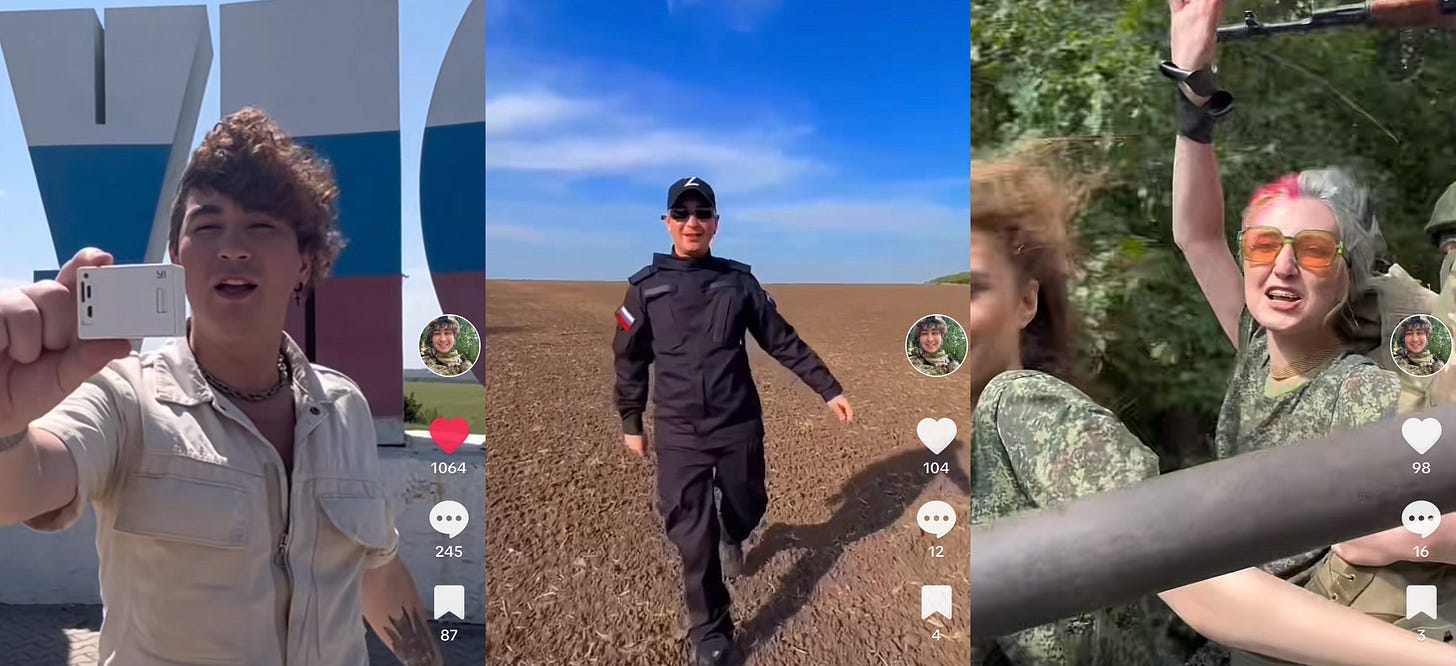#103: Political Influencer Problems
Shadowy marketing firms pay armies of influencers to promote political content
Hello.
You are reading Understanding TikTok. My name is Marcus. I am a research fellow at HAW Hamburg. Here is your TikTok update. Today we talk about
🇺🇸 Political Influencer Problems
🇷🇺 Russian Propaganda
🇪🇺 Deepfakes & AI Labels
🏁 Stuff
🇺🇸 US Elections: Political Influencer Problems
The 2024 United States presidential election is scheduled for Tuesday, November 5, 2024. We have a couple of months before that but “groups in the U.S. are already using new strategies to manipulate public opinion in the lead-up to the election. Shadowy marketing firms now pay vast armies of TikTok influencers to promote political content with the goal of swaying young voters”, write researchers Woolley, Riedl, and Lukito from the Propaganda Research Lab at the University of Texas in Washington’s prestigious news outlet The Hill.
Their findings echo reports from two years ago when a team of researchers from the Mozilla foundation revealed that loopholes and lax enforcement made TikTok especially vulnerable to abuse by political groups. Yet again marketing companies “take advantage of weak regulations related to disclosure in order to hide their relationships with mainstream political groups and to give their synthetic influence campaigns the illusion of being ‘authentic.’”
It is due time to learn more about the power of political influencers that are at the heart of these campaigns (NYT) including mobilized micro- & nano-influencers. Thankfully Woolley, Riedl, and Lukito not only published an op-ed in The Hill but an entire issue of the journal Social Media+Society, where they brought together several research teams to study political influencers across six countries and nine social media platforms. You can find articles here, here and here.
🇷🇺 Russian Propaganda: TikTok Influencers Travel to Mariupol
In February TikTok said it shut down two coordinated networks of about 1,700 pro-Russian influencers who attempted to use the platform to mislead Europeans about the Ukraine war (Insider). But there are obviously more. And they keep on posting as Sophie Fullerton researcher on conflicts and misinformation tweets:
A group of influencers from Moscow recently took a trip to Mariupol to pose next to rubble and film themselves feeding the locals. Since May 2022 Mariupol has been occupied by Russian forces. The influencers also got the chance to cosplay as Russian soldiers and ride military tanks through the abandoned city streets (*). According to the influencers Mariupol can now “breath a sigh of relief” thanks to Russia (*).
Captions, speech and most comments of the videos are in Russian obviously targeting people in the region. “Like and comment if you are from Donetsk” reads the caption of one of the videos. Two of the influencers have more than 1 million likes each and 40,1k and 141,2k followers. Not only Russia uses influencers to whitewash the regime. Syria for example has been using “travel bloggers” to “praise” and “educate” (Washington Post).
🇪🇺 Deepfakes & AI Labels
Members of the European Commission, the EU’s executive arm called for tech giants including Google, Meta, TikTok and Microsoft to start labeling AI content on a voluntary basis, well in advance of legislation that would make it obligatory. The EU is currently working on an AI Act that would set rules for the use of AI technology in the 27-country union. Even if the provisions likely wouldn’t come into force before 2026.
The EU is widely seen as the leader in regulation of tech companies and it is developing separate laws on artificial intelligence with the code of practice – agreed by 44 companies including TikTok and YouTube – viewed as the route to prepare for the new regulatory regime (Guardian).
As the prospect of a US TikTok ban continues to grow, TikTok has refreshed its content moderation policies in March. The rules on what content can be posted and promoted are largely unchanged but include new restrictions on sharing AI deepfakes, which have become increasingly popular on the app in recent months (The Verge). Besides that TikTok – according to The Information – is working on a tool that will allow content creators to disclose whether their uploads utilized generative artificial intelligence. If this holds true for TikTok’s own free AI tool (SearchEngineLand) that can create scripts in a matter of seconds?
🏁 What else?
🚴 TikTok Shop Is Testing Visual Search (AdWeek)
🚴 ByteDance accused of helping China spy on Hong Kong activists (BBC)
🚴 MigrantTok (USA Today)
🚴 We’re proud to to bring the TikTok experience to screens at fuel retailers (TikTok)
🚴 TikTok is an everyone app (Jack Appleby)
🚴 TikTok is opening up its paywall and 20-minute video feature (The Verge)
🚴 Danke Otto Danke (Mopop)
Anything you would like me to cover? Any questions? Happy to discuss in the comments. And now please recommend this newsletter to a person you know. Thanks a lot! Speak soon. Ciao, Marcus.






